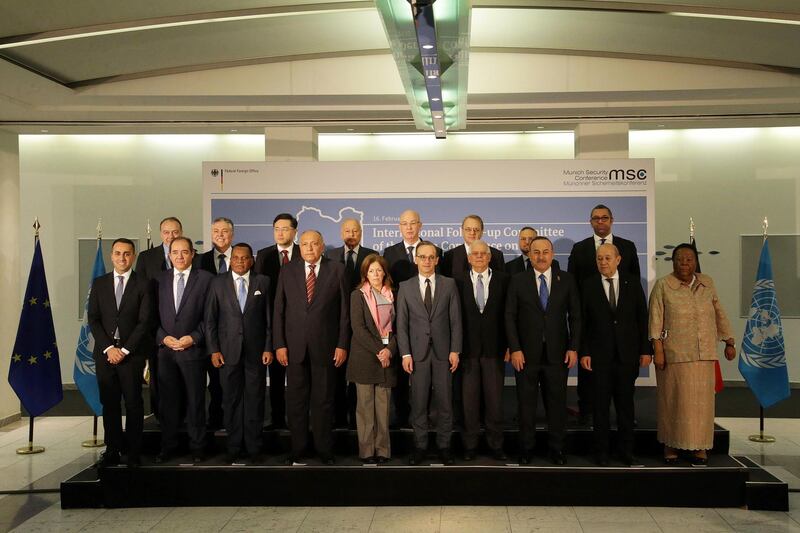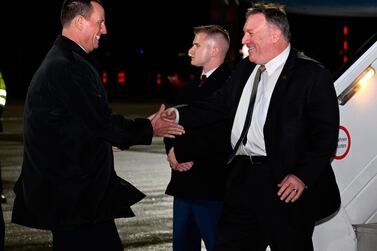Progress toward a lasting ceasefire in Libya that would allow full scale talks between the country’s warring factions was backed by a 13-nation meeting of the Berlin Conference process on Sunday.
In a joint communique issued after the meeting in Munich, the countries, which included the UAE, Europeans, Russia and the US, resolved to take step-by-step measures toward reconciliation, including an inclusive Libyan political forum to be held in Geneva before the end of the month.
Outlining an intense schedule of meetings focused on Libya, the German Foreign Minister Heiko Maas said he would propose the establishment of a European Union mission to enforce the Libyan arms embargo at a meeting of the bloc's foreign ministers on Monday.
"A resolution will be found that contains an EU contribution to the enforcement of the weapons embargo, in a way that is acceptable for all EU member states," Mr Maas told a press conference on the sidelines of the annual Munich Security Conference.
"We still need to talk about who contributes what, but there is an EU satellite that is already there," he said. "In addition we have not succeeded in deciding, due to differing opinions, whether ships could also be deployed.”
“The words of Berlin must be followed by deeds,” he added.
Josep Borrell, the EU’s top foreign affairs official, described as “ridiculous” that countries were blocking the deployment of naval vessels to the southern Mediterranean-focused Operation Sophia.
“If we fail to bring peace to Libya, I will doubt our capacity to act," he told the Munich forum. "Europe has to develop an appetite for power. How can you be a geostrategic actor if you do not have competencies when it comes to foreign policy and defence? It [now] lies with the EU member states."
Stephanie Williams, the UN’s deputy special envoy for Libya, said that there was good progress in military to military talks as well as at an economic committee, and the third political track now needed to be revamped. The situation on the ground was however deeply troubling. “We have the necessary tools to allow us all to turn words into action,” she said. “The truce is holding only by a thread.”
She added that the embargo on weapons shipments to the conflict was a “joke” at this point.
Following the passage of the 55-point UN Security Council resolution 2510, the diplomats behind the format have been keen to involve the African Union and Arab League in the commitments to monitor and strengthen the ceasefire between Tripoli’s Government of National Accord (GNA) and the Libyan National Army.
Italy, which has been close to the GNA, is taking on the rotating chair of the Berlin process and will reconvene the partners in Rome next month.
The joint military committee working to lock in a permanent cease-fire is due to meet in Geneva on Tuesday.
Maas declared the activity was sufficient to keep pushing forward. “Despite all the areas where we haven’t reached our goal, the path that we’ve chosen is functioning and the diplomatic engagement in the past days has been effective,” Mr Maas told reporters.
Meanwhile the government of Greece is braced for another Berlin attendee, Turkey, to lodge details of its joint maritime agreement with the GNA with the UN.
A document that demarks a disputed new exclusive economic zone stretching from Turkey to Libya is expected to be published by the United Nations’ Division for Ocean Affairs and the Law of the Sea and inclusion of the sea zone maps in the UN's database is expected to grant the agreement an official character.
Turkish officials have said the new maritime zone will allow it to grant exploration licences for drilling activities across the whole span of the sea.
Greece has expressed strong opposition to the geographical co-ordinates outlined in the maritime border agreement.
The accord effectively makes the sea bed off the south of the island of Crete part of Turkey’s exclusive economic zone.








